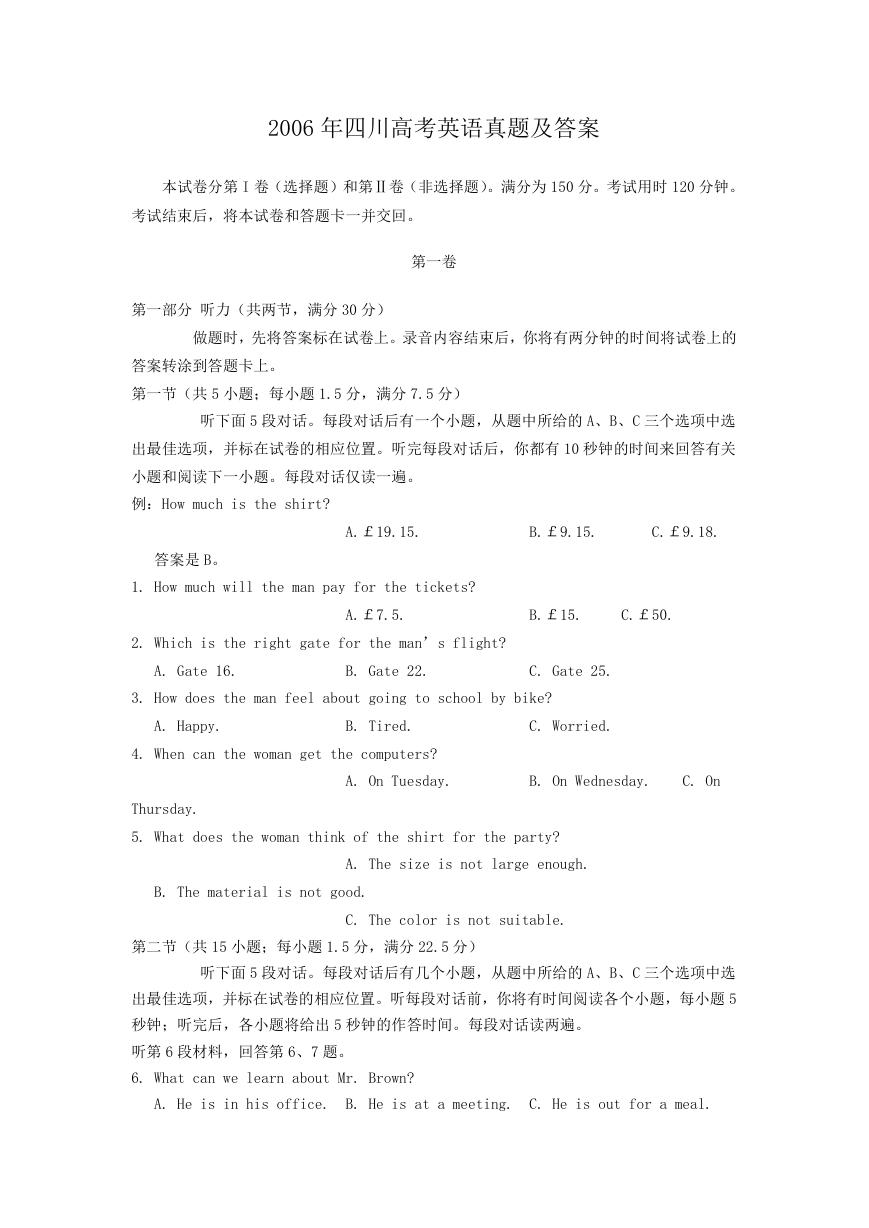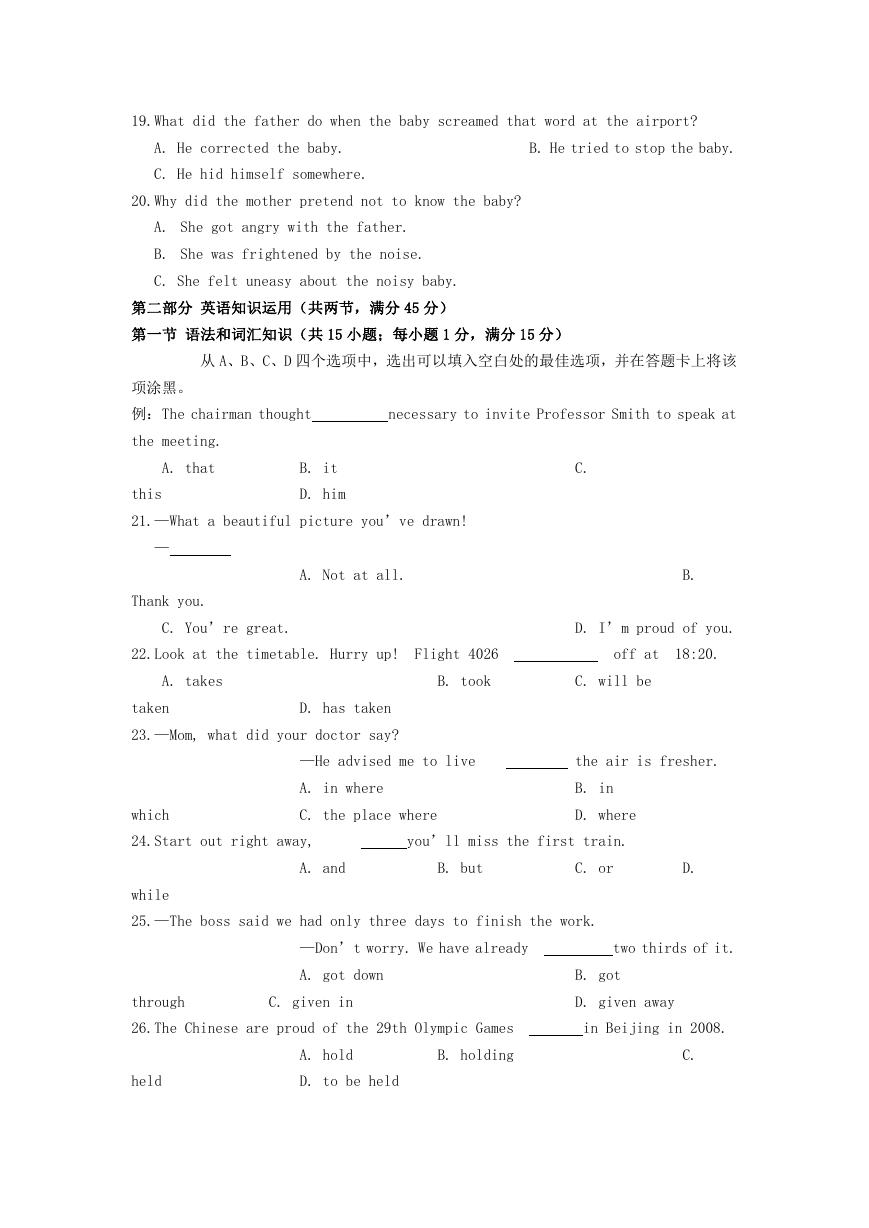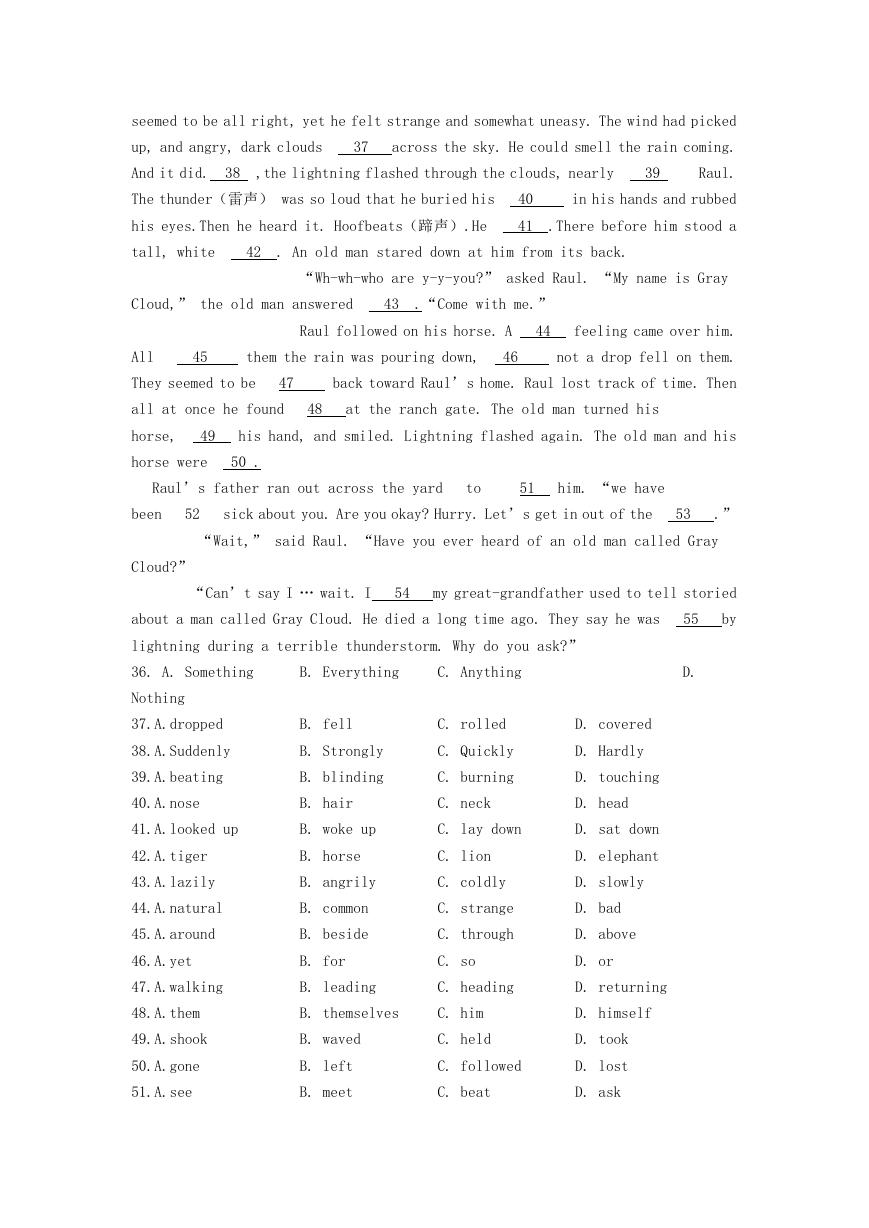2006 年四川高考英语真题及答案
本试卷分第 I 卷(选择题)和第Ⅱ卷(非选择题)。满分为 150 分。考试用时 120 分钟。
考试结束后,将本试卷和答题卡一并交回。
第一卷
第一部分 听力(共两节,满分 30 分)
做题时,先将答案标在试卷上。录音内容结束后,你将有两分钟的时间将试卷上的
答案转涂到答题卡上。
第一节(共 5 小题;每小题 1.5 分,满分 7.5 分)
听下面 5 段对话。每段对话后有一个小题,从题中所给的 A、B、C 三个选项中选
出最佳选项,并标在试卷的相应位置。听完每段对话后,你都有 10 秒钟的时间来回答有关
小题和阅读下一小题。每段对话仅读一遍。
例:How much is the shirt?
A.£19.15.
B.£9.15.
C.£9.18.
答案是 B。
1. How much will the man pay for the tickets?
A.£7.5.
B.£15.
C.£50.
2. Which is the right gate for the man’s flight?
A. Gate 16.
B. Gate 22.
C. Gate 25.
3. How does the man feel about going to school by bike?
A. Happy.
B. Tired.
C. Worried.
4. When can the woman get the computers?
A. On Tuesday.
B. On Wednesday.
C. On
Thursday.
5. What does the woman think of the shirt for the party?
A. The size is not large enough.
B. The material is not good.
第二节(共 15 小题;每小题 1.5 分,满分 22.5 分)
C. The color is not suitable.
听下面 5 段对话。每段对话后有几个小题,从题中所给的 A、B、C 三个选项中选
出最佳选项,并标在试卷的相应位置。听每段对话前,你将有时间阅读各个小题,每小题 5
秒钟;听完后,各小题将给出 5 秒钟的作答时间。每段对话读两遍。
听第 6 段材料,回答第 6、7 题。
6. What can we learn about Mr. Brown?
A. He is in his office.
B. He is at a meeting.
C. He is out for a meal.
�
7. What will the man probably do next?
A. Call back.
B. Come again.
C. Leave a
message.
听第 7 段材料,回答第 8、9 题。
8. What kind of room does the man want to take?
A. A single room.
B.A double room.
C.A
room for three.
9.What does the man need to put in the form?
A. Telephone and student card numbers.
B. Student card number and address.
C. Address and telephone number.
听第 8 段材料,回答第 10 至 12 题。
10. What is the relationship between the speakers?
A. Fellow clerks.
B. Boss and secretary.
C. Customer and salesperson.
11. What does the man like about his job?
A. Living close to the office.
B. Chances to go abroad.
C. Nice people to work with.
12. What do we know about the woman?
A. She likes traveling.
B. She is new to the company.
C. She works in public relations.
听第 9 段材料,回答第 13 至 16 题。
13.When will the visitors come?
A. In March.
B. In April.
C. In May.
14.How many visitors are coming?
A.8.
B.10.
C.12
15.What will the visitors do on the second day?
A. Go to a party.
B. Visit
schools.
C. Attend a lecture.
16.Where will the visitors go on the final day?
A. To London.
B. To Scotland. C. To the
coast.
听第 10 段材料,回答第 17 至 20 题。
17.What is the first word the baby tried to say?
A. Truck.
B.OK.
C. Duck.
18.How old was the baby when he learned to say that word correctly?
A. About 18 months.
B. About 21
months.
C. About 24 months.
�
19.What did the father do when the baby screamed that word at the airport?
B. He tried to stop the baby.
A. He corrected the baby.
C. He hid himself somewhere.
20.Why did the mother pretend not to know the baby?
A. She got angry with the father.
B. She was frightened by the noise.
C. She felt uneasy about the noisy baby.
第二部分 英语知识运用(共两节,满分 45 分)
第一节 语法和词汇知识(共 15 小题;每小题 1 分,满分 15 分)
从 A、B、C、D 四个选项中,选出可以填入空白处的最佳选项,并在答题卡上将该
项涂黑。
例:The chairman thought
necessary to invite Professor Smith to speak at
the meeting.
A. that
this
B. it
D. him
21.—What a beautiful picture you’ve drawn!
C.
—
Thank you.
C. You’re great.
A. Not at all.
B.
D. I’m proud of you.
22.Look at the timetable. Hurry up!
Flight 4026
off at
18:20.
A. takes
B. took
C. will be
taken
D. has taken
23.—Mom, what did your doctor say?
—He advised me to live
the air is fresher.
which
C. the place where
A. in where
B. in
D. where
24.Start out right away,
you’ll miss the first train.
A. and
B. but
C. or
D.
while
25.—The boss said we had only three days to finish the work.
—Don’t worry. We have already
two thirds of it.
through
C. given in
A. got down
B. got
D. given away
26.The Chinese are proud of the 29th Olympic Games
in Beijing in 2008.
A. hold
B. holding
C.
held
D. to be held
�
27.—Did you enjoy yourself at the party?
—Yes. I’ve never been to
one before.
A. a more excited
B. the most excited
C. a
more exciting
D. the most exciting
28.At the foot of the mountain
.
A. a village lie
B. lies a
village
C. does a village lie
D. lying a village
29.—Can he take charge of the computer company?
—I’m afraid it’s
his ability.
A. beyond
B. within
C. of
D. to
30.—It’s thirty years since we last met.
—But I still remember the story, believe it or
not,
that
we got lost on a rainy night.
A. which
C. what
D. when
B.
31.Of all the books on the desk,
is of any use for our study.
neither
A. nothing
D. none
32.—Is Jack on duty today?
B. no one
C.
—It
be him. It’s his turn tomorrow.
A. mustn’t
B. won’t
C.
can’t
D. needn’t
33. with so much trouble, we failed to complete the task on time.
A. Faced
B. Face
C. Facing
D. To face
34. —Do you mind my smoking her?
—
.
idea.
A. No, thanks.
C. Yes, please.
35. —Why didn’t you tell him about the meeting?
B. No. Good
D. Yes, Better not.
—He rushed out of the room
I could say a word.
A. before
B. until
C.
when
D. after
第二节 完形填空(共 20 小题;每小题 1.5 分,满分 30 分)
阅读下面短文,从短文后所给的四个选项(A、B、C 和 D)中,选出可以填入空
白处的最佳选项,并在答题卡上将该项涂黑。
One day,Raul was miles away from the small ranch(牧场) house in a large
valley.
36
�
seemed to be all right, yet he felt strange and somewhat uneasy. The wind had picked
up, and angry, dark clouds
37
across the sky. He could smell the rain coming.
And it did.
38
,the lightning flashed through the clouds, nearly
39
Raul.
The thunder(雷声) was so loud that he buried his
his eyes.Then he heard it. Hoofbeats(蹄声).He
40
41
in his hands and rubbed
.There before him stood a
tall, white
42
. An old man stared down at him from its back.
“Wh-wh-who are y-y-you?” asked Raul. “My name is Gray
Cloud,” the old man answered
43
.“Come with me.”
Raul followed on his horse. A
44
feeling came over him.
All
45
them the rain was pouring down,
46
not a drop fell on them.
They seemed to be
47
back toward Raul’s home. Raul lost track of time. Then
all at once he found
48
at the ranch gate. The old man turned his
horse,
49
his hand, and smiled. Lightning flashed again. The old man and his
horse were
50 .
Raul’s father ran out across the yard
to
51
him. “we have
been
52
sick about you. Are you okay? Hurry. Let’s get in out of the
53
.”
“Wait,” said Raul. “Have you ever heard of an old man called Gray
Cloud?”
“Can’t say I … wait. I
54
my great-grandfather used to tell storied
about a man called Gray Cloud. He died a long time ago. They say he was
55
by
lightning during a terrible thunderstorm. Why do you ask?”
36. A. Something
B. Everything
C. Anything
D.
Nothing
37.A.dropped
B. fell
C. rolled
D. covered
38.A.Suddenly
B. Strongly
C. Quickly
D. Hardly
39.A.beating
B. blinding
C. burning
D. touching
40.A.nose
B. hair
C. neck
D. head
41.A.looked up
B. woke up
C. lay down
D. sat down
42.A.tiger
43.A.lazily
44.A.natural
45.A.around
46.A.yet
B. horse
C. lion
D. elephant
B. angrily
C. coldly
D. slowly
B. common
B. beside
B. for
C. strange
C. through
C. so
D. bad
D. above
D. or
47.A.walking
B. leading
C. heading
D. returning
48.A.them
49.A.shook
50.A.gone
51.A.see
B. themselves
C. him
D. himself
B. waved
B. left
B. meet
C. held
C. followed
C. beat
D. took
D. lost
D. ask
�
52.A.waited
53.A.yard
B. wind
54.A.believe
B. consider
55.A.defeated
B. caught
C. damaged
第三部分 阅读理解(共 20 小题;每小题 2 分,满分 40 分)
B. thought
C. worried
D. excited
C. grass
C. doubt
D. rain
D. forget
D. struck
阅读下列 5 篇短文,从每题所给的四个选项(A、B、C 和 D)中,
选出最佳选项,并在答题卡上将该项涂黑。
A
I was the middle child of three, but there was a gap of five
years on either side, and I hardly saw my father before I was eight. For this and
other reasons I was somewhat lonely. I had the onely child’s habit of making up
stories and holding conversations with imaginary persons, and I think from the very
start my literary ambitions(文学志向) were mixed up with the feeling of being
isolated(孤独) and undervalued. I knew that I had a natural ability with words
and a power of facing unpleasant facts, and I felt that this created a sort of private
world in which I could get my own back for my failure in everyday life.
However, the quantity of serious writing which I produced all through my
childhood would not add up to half a dozen pages. I wrote my first poem at the age
of four or five, my mother taking it down to dictation. I cannot remember anything
about it except that it was about a tiger and the tiger had “chair-like teeth”
- a good enough expression. At eleven, when the war of 1914-18 broke out, I wrote
a poem which was printed in the local(地方的) newspaper, as was another, two years
later, on the death of Kitchener. From time to time, when I was a bit older, I wrote
bad and usually unfinished “nature poems”. I also, about twice, attempted a short
story which was a failure. That was the total of the would-be serious work that I
actually set down on paper during all those years.
56.The underlined word “it” in paragraph 2 refers to
.
A. the quantity of serious writing
B. the writer’s first poem
C. the writer’s childhood
D. the tiger in the poem
57.From the text, we learn that as a little boy the writer
.
A. had no playmates
B. showed his gift for writing
C. put out lots of poems and stories
D. got his first poem published in 1916
58.What can be inferred about the writer?
A. He was least favoured in his family.
�
B. He had much difficulty in talking with others.
C. He had an unhappy childhood for lack of care.
D. His loneliness resulted in his interest in writing.
B
Welcome to Ontario Parks, a new body set up to manage Ontario’s most treasured
special places, the parks in our area.
We are entering a very exciting year for Ontario Parks. Last season we asked
some 15,000 visitors in 45 parks how we could improve our programs and services.
We also looked at the thousands of comment cards we received. As a result, new comfort
stations have been added, the number of campsites has been increased, and we’ve
made other fzcility(设施) improvements. In addition, we’ll be providing more
educational programs. This year, for example, more than 40 parks will offer special
day and evening activities to excite your curiosity about nature and history.
Through the Internet, you’ll be happy to know that you can now explore all
270 parks on line. Let your family plan your park vacation, study a map of canoe
routes, listen to the call of a loon or find up-to-date information about programs,
services and facilities.
So come and discover what Ontario Parks has to offer. Our parks are places
to go with families and friends, for relaxation and fun, or simply to get away from
it all. They are places where we can enrich our souls and “recharge our internal
(内部的) batteries”. They provide chances to explore nature, see wildlife, swim,
canoe, camp, hike, picnic, ride a bike… You’ll enjoy some of the best outdoor
experiences available anywhere in the world.
We urge you to make 2006 the year that you come out and have an Ontario Parks
experience!
59.The writer’s purpose in writing the text is to
.
A. tell more people the improvements in Ontario Parks
B. attract more people to explore the parks on line
C. praise the beauty of nature in Ontario Parks
D. have more people visit the parks
60.The facility improvements of Ontario Parks include
.
A. new programs and services
B. new comfort stations and campsites
C. comfort stations and special activities
D. new campsites and educational programs
61.From paragraph 4, we know that Ontario Parks offers visitors
.
A. the world’s new sports and games
�
B. the most exciting adventures in the world
C. many choices to relax and refresh themselves
D. chances to experience all the outdoor activities
62.According to the text, we can safely say that
.
A. some visitors suggested more campsites
B. about 15,000 people visited 45 parks last season
C. many more people will visit Ontario Parks in 2006
D. the manager of Ontario Parks worries they will have fewer visitors
C
Juanito Estrella has been a housekeeping manager on the US-based large
passenger ship Carnival Spirit for 18 months and feels he
has found the suitable
position in his career(职业).He has always wanted to travel. “I guess I am a really
restless spirit. I Iike traveling, so when the chance came, I jumped at it,” he
says.
The chance came in the form of a newspaper advertisement for work on cruise ships
(游船).At the time Estrella was the housekeeping manager at a Melbourne hotel.
He applied and, after two interviews, a medical check and police clearance, the job
was his.
Estrella is responsible(负责的)for the cleanliness of the ship, making sure that
160 crew work properly. “I enjoy it because there is no other work-you wake up each
day in a different place and a different cnlture. It’s exciting when you go to the
next country and you don’t understand the language,” he says.
Estrella likes being busy and getting to know people from all
over the world. The 1,000 crew come from 94 countries, and Estrella has learnt Spanish
and a little Croatian.
But there is a downside .“You cannot get really drunk...because you have safety
responsibilities to yourself and others,” he says. “You don’t really think about
home. You start tothink about home only when you get closer to your vacation and
wonder what you’ll be doing.”
Life on the ship is anything but cruising.Estrella and his fellows work at least
10 hours a day, seven days a week. He warns the job is not for everybody. “You have
to love being busy and be prepared to work every day-and to give up drinking too
much alcohol.” In his spare time, if the ship sails into a port, Estrella explores
it, otherwise he works out in the crew’s gym, goes on the internet or calls home.
63.What do we know about Estrella?
A. He is very fond of traveling.
B. He doesn’t drink wine now.
C. He cannot speak a foreign language.
�
















 2023年江西萍乡中考道德与法治真题及答案.doc
2023年江西萍乡中考道德与法治真题及答案.doc 2012年重庆南川中考生物真题及答案.doc
2012年重庆南川中考生物真题及答案.doc 2013年江西师范大学地理学综合及文艺理论基础考研真题.doc
2013年江西师范大学地理学综合及文艺理论基础考研真题.doc 2020年四川甘孜小升初语文真题及答案I卷.doc
2020年四川甘孜小升初语文真题及答案I卷.doc 2020年注册岩土工程师专业基础考试真题及答案.doc
2020年注册岩土工程师专业基础考试真题及答案.doc 2023-2024学年福建省厦门市九年级上学期数学月考试题及答案.doc
2023-2024学年福建省厦门市九年级上学期数学月考试题及答案.doc 2021-2022学年辽宁省沈阳市大东区九年级上学期语文期末试题及答案.doc
2021-2022学年辽宁省沈阳市大东区九年级上学期语文期末试题及答案.doc 2022-2023学年北京东城区初三第一学期物理期末试卷及答案.doc
2022-2023学年北京东城区初三第一学期物理期末试卷及答案.doc 2018上半年江西教师资格初中地理学科知识与教学能力真题及答案.doc
2018上半年江西教师资格初中地理学科知识与教学能力真题及答案.doc 2012年河北国家公务员申论考试真题及答案-省级.doc
2012年河北国家公务员申论考试真题及答案-省级.doc 2020-2021学年江苏省扬州市江都区邵樊片九年级上学期数学第一次质量检测试题及答案.doc
2020-2021学年江苏省扬州市江都区邵樊片九年级上学期数学第一次质量检测试题及答案.doc 2022下半年黑龙江教师资格证中学综合素质真题及答案.doc
2022下半年黑龙江教师资格证中学综合素质真题及答案.doc